Related Research Articles

Punjab, also known historically as Panchanada and Pentapotamia, is a geopolitical, cultural, and historical region in South Asia. It is specifically located in the northern part of the Indian subcontinent, comprising areas of modern-day eastern-Pakistan and northwestern-India. Punjab's major cities are Lahore, Faisalabad, Rawalpindi, Gujranwala, Multan, Ludhiana, Amritsar, Sialkot, Chandigarh, Shimla, Jalandhar, Gurugram, and Bahawalpur.

Punjabi, sometimes spelled Panjabi, is an Indo-Aryan language native to the Punjab region of Pakistan and India. It is one of the most widely spoken native languages in the world with approximately 113 million native speakers.
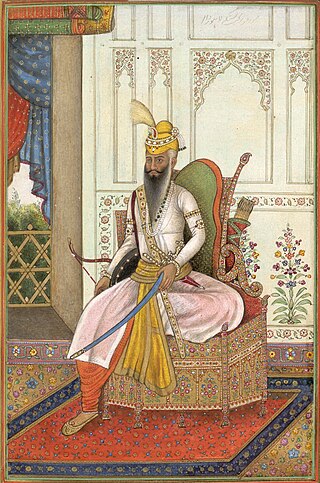
Ranjit Singh, popularly known as Sher-e-Punjab or "Lion of Punjab", was the first Maharaja of the Sikh Empire, which ruled the northwest Indian subcontinent in the early half of the 19th century. He survived smallpox in infancy but lost sight in his left eye. He fought his first battle alongside his father at age 10. After his father died, he fought several wars to expel the Afghans in his teenage years and was proclaimed as the "Maharaja of Punjab" at age 21. His empire grew in the Punjab region under his leadership through 1839.

Sayyid Abdullah Shah Qadri, known popularly as Baba Bulleh Shah and Bulleya, was a 17th and 18th-century Punjabi revolutionary philosopher, reformer and a Sufi poet, universally regarded as the "Father of Punjabi Enlightenment". He spoke against powerful religious, political and social institutions. He lived and was buried in Kasur.
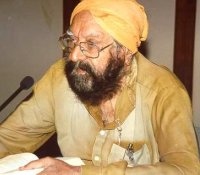
Khushwant Singh was an Indian author, lawyer, diplomat, journalist and politician. His experience in the 1947 Partition of India inspired him to write Train to Pakistan in 1956, which became his most well-known novel.

Kartar Singh Duggal was an Indian writer who wrote in Punjabi, Urdu, Hindi, and English. His works include short stories, novels, dramas and plays. His works have been translated into Indian and foreign languages. He has served as director of the All India Radio.
Rai Abdullah Khan Bhatti popularly known through his Punjabi moniker, Dulla or Dullah Bhatti, is a Punjabi folk hero who came from the Pakistani Punjab region and led the Punjabis to a revolt against Mughal rule during the reign of the Mughal emperor Akbar. He is entirely absent from the recorded history of the time, and the only evidence of his existence comes from Punjabi folk songs.

Haqiqat Rai Baghmal Puri was an 18th-century martyr from Sialkot, who was executed in Lahore during the time of Zakariya Khan.

Sobha Singh was an artist from Punjab, India.
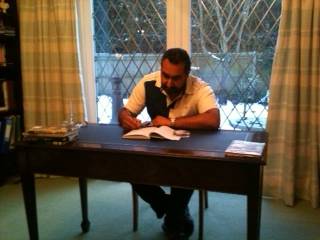
Rupinderpal Singh Dhillon or Roop Dhillon is a British Punjabi writer of fiction and poetry.

Sardar Gurbachan Singh was a Sikh scholar, professor, and author. He was born in Moonak, Sangrur district. He was a lecturer at the Sikh National College at Lahore. At the Banaras Hindu University he held the Guru Nanak Chair of Sikh Studies. He received the Padma Bhushan in 1985. He received in 1985 the National fellowship by the Indian Council of Historical Research, New Delhi.
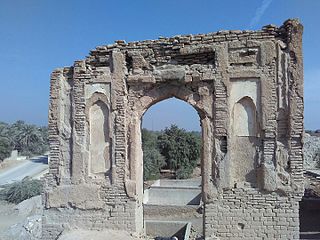
Aror or Alor or Arorkot is the medieval name of the city of Rohri. Aror once served as the capital of Sindh.
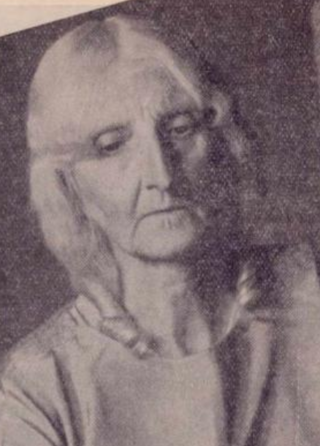
Norah Richards was an Irish actress and theatre practitioner, who was later called the Lady Gregory of the Punjab. She devoted 60 years (1911–1971) of her life towards enriching the culture of the area. She came to the Punjab in 1911 and produced the first Punjabi play, Dulhan, written by her pupil I. C. Nanda in 1914.

The Bhangi Misl was a large and powerful Sikh Misl headquartered in Amritsar. It was founded in the early 18th century by Sardar Chhajja Singh Dhillon, who was baptised by Banda Singh Bahadur. The misl received its name "Bhangi" because Chhajja Singh and his soldiers frequently used the herbal intoxicant bhang. It was a first misl to established a Khalsa Raj and publish Khalsa currency coins. The Bhangi Kingdom/Misl was founded by Dhillon Jats.
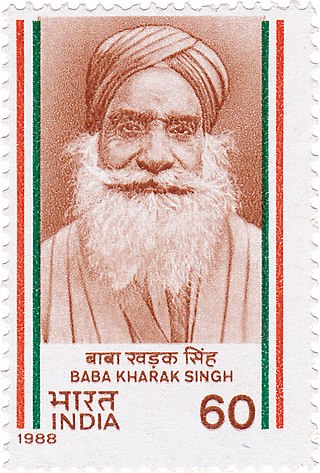
Baba Kharak Singh was an Indian playwright born at Sialkot in British India. He was involved in the Indian independence movement and was president of the Central Sikh League.

Binod Singh, a Trehan Khatri and a descendant of Guru Angad, was an army man and disciple of Guru Gobind Singh and was among few Sikhs who accompanied him to Nanded in 1706. In Budha Dal Chronicles, Guru Gobind Singh made Baba Binod Singh the head of the Khalsa.
Andretta is a village and an artists' colony in Himachal Pradesh. The artists' colony was established in the 1920s, when Irish theatre artiste and environmentalist, Norah Richards, shifted here from Lahore. Near Palampur in the Kangra District, with Dhauladhar range of the Himalayas as a backdrop, Andretta over the years has attracted many noted artists, theatre practitioners, painters and more recently potters. Two of the people who became associated with it early on were painters Sobha Singh and B. C. Sanyal.
Punjabi Muslims are adherents of Islam who identify ethnically, linguistically, culturally, and genealogically as Punjabis. With a population of more than 109 million, they are the largest ethnic group in Pakistan and the world's third-largest Islam-adhering ethnicity after Arabs and Bengalis. The majority of Punjabi Muslims are adherents of Sunni Islam, while a minority adhere to Shia Islam. They are primarily geographically native to the Punjab province of Pakistan, but many have ancestry from the Punjab region as a whole.
Jagjit Singh Anand was an Indian communist activist, journalist, author, and freedom fighter. He was the editor of Nawan Zamana for more than half a century. He is known for his plain speaking on the opportunism of the Akalis,, the Congress, and the terrorists during the Punjab Crisis in the last two decades of the twentieth century. Anand countered death threats defiantly: "I will not be cowed down by death threats and attempts on my life by the extremists and I will uphold the freedom of the press at all costs."
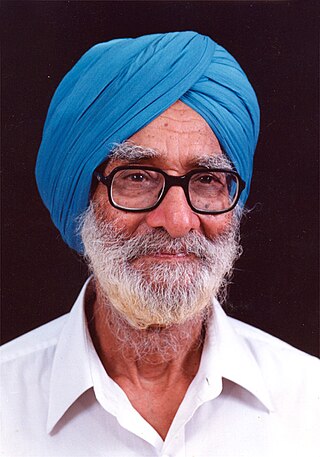
Dr. Harcharan Singh (1914–2006) was an Indian dramatist and writer in the Punjabi language. He dedicated 69 years of his life to Punjabi theater, in which he authored 51 books and staged numerous plays all over the world.
References
- ↑ ਰਛਪਾਲ ਸਿੰਘ ਗਿੱਲ (2004). ਪੰਜਾਬ ਕੋਸ਼ ਜਿਲਦ ਦੂਜੀ (in Punjabi). ਭਾਸ਼ਾ ਵਿਭਾਗ ਪੰਜਾਬ. p. 201.
- 1 2 "Ishwar Chander Nanda" . Retrieved 14 September 2014.
- ↑ Lal, Ananda (2004). Oxford Reference. Oxford University Press. ISBN 978-0-19-564446-3 . Retrieved 14 September 2014.
- ↑ Sī. Aila Nāraṅga (1987). History of Punjabi Literature, 850-1850 A.D. National Book Shop. p. 9.
- ↑ J. S. Grewal (1986). The Emergence of Punjabi Drama: A Cultural Response to Colonial Rule. Guru Nanak Dev University. p. 33.
- ↑ Sant Singh Sekhon; Kartar Singh Duggal (1992). A History of Punjabi Literature. Sahitya Akademi Publications. p. 333. ISBN 978-81-7201-292-2.
- ↑ ਡਾ. ਰਘਬੀਰ ਸਿੰਘ (2007). ਮੰਚ ਦਰਸ਼ਨ (in Punjabi). ਪਬਲੀਕੇਸ਼ਨ ਬਿਊਰੋ ਪੰਜਾਬੀ ਯੂਨੀਵਰਸਿਟੀ ਪਟਿਆਲਾ. pp. 147–148, 167. ISBN 978-81-7380-153-2.